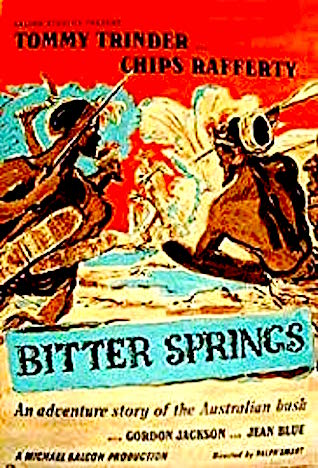Search
Recent comments
- new tariffs....
1 hour 16 sec ago - crummy....
19 hours 13 min ago - RC into A....
21 hours 6 min ago - destabilising....
22 hours 10 min ago - lowe blow....
22 hours 42 min ago - names....
23 hours 19 min ago - sad sy....
23 hours 44 min ago - terrible pollies....
23 hours 54 min ago - illegal....
1 day 1 hour ago - sinister....
1 day 3 hours ago
Democracy Links
Member's Off-site Blogs
when starting from square one was a good thing, now we are behind the eighth ball still...

In the early 1900s, Wally King travels 600 miles to outback South Australia to occupy land he has leased from the government. He is accompanied by his wife Ma, children Emma and John, and friends Tommy and Mac. Despite warnings from a local trooper, the bigoted King clashes with an Aboriginal tribe who depend on water located on what has become the family's property.
Relations with the local Aboriginal people deteriorate to the point where John King is speared. The Kings are in danger of being killed by a raiding party but they are rescued by the trooper and his men. A compromise is reached where the Kings agree to work with the Aboriginal people running a sheep station.[3]
Read more:
https://en.wikipedia.org/wiki/Bitter_Springs_(film)
Note: the movie was released in 1950...
- By Gus Leonisky at 1 Mar 2019 - 12:42pm
- Gus Leonisky's blog
- Login or register to post comments
the disease in the australian psyche...
Here is a little truth we haven't heard much about this week: We know how to close the gap.
Hundreds of thousands of Indigenous people are living successful, healthy, stimulating lives. I am one of them.
A 2016 Centre for Independent Studies report that found that of 550,000 Indigenous people identified in the 2011 census, "approximately 65 per cent (350,000) are in employment and living lives not noticeably different from the rest of Australia".
In fact, I am more privileged than most other Australians.
It wasn't always that way: much of my childhood was one of bare-bones poverty: transient; itinerant; no permanent home or consistent schooling.
To add to our poverty — if not in fact the cause of it — my family was Aboriginal, enduring a legacy of state-sanctioned discrimination and a history often marked by brutality.
Yet, neither history, nor race, nor class need be destiny: if they were, I wouldn't be here.
Here's another truth: All of the Indigenous leaders and political figures we have seen and heard from this week have closed the gap too.
They are remarkable examples of resilience and determination. If ever there were people who speak to the power of the "Australian dream", it is these people, because they have paid the highest price.
There is more to Indigenous AustraliaWe are not good at telling this story: far more predictable and enticing is the tale of deficit and disadvantage.
Statistically it is true: Indigenous people, as a group, have the lowest life expectancy; the highest infant mortality; the highest levels of imprisonment; and the worst health, housing, education and employment outcomes.
This year's closing the gap report reveals a failure to meet four out of seven targets and it is a measure of our low expectations that Malcolm Turnbull calls that a good result.
Clearly, there are two stories: entrenched misery and remarkable success.
The numbers tell an apparently contradictory tale. According to the Bureau of Statistics there are 11,000 Indigenous people in prison; there are around 30,000 Indigenous university graduates and about 15,000 currently enrolled.
Three times as many Aboriginal people and Torres Strait islanders have university degrees as are behind bars, yet the story of suffering appears to resonate more powerfully in the media and in the Australian imagination.
Read more:
https://www.abc.net.au/news/2018-02-13/stan-grant-we-know-how-to-close-t...
Note: The title of this comment would frighten Stan Grant: "the disease in the Australian psyche...". But it is Gus' view and he thinks it's accurate. the situation is like a disease or a scab on your skin you always pick at and and it never heals...